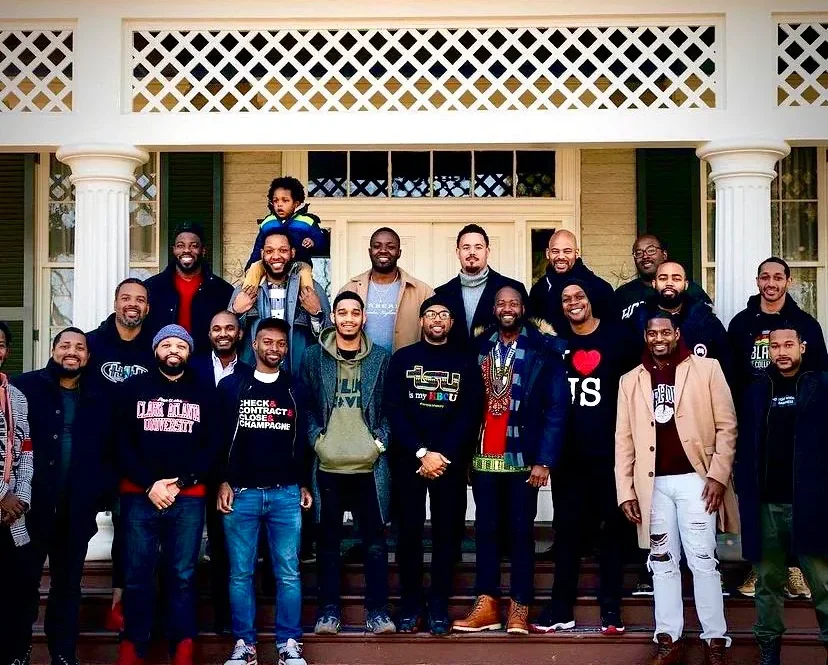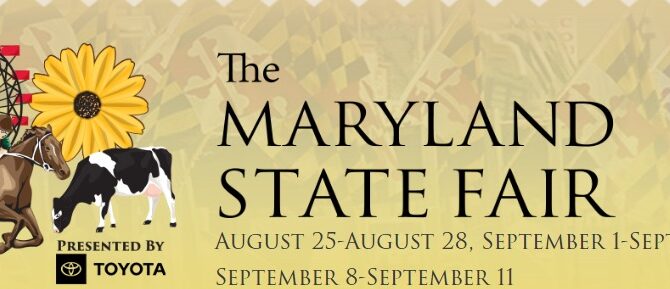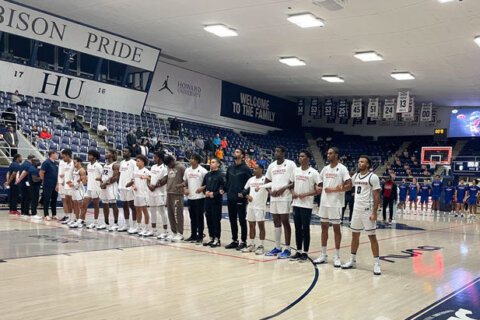Ownership Matters, a collective of Black homeowners, established a tradition to gather for an annual photoshoot on Juneteenth in front of Fredrick Douglass’s historic home in Southeast.
“About 150 folks came together in front of Fredrick Douglass’ house [to] take a big group photo,” said Gregory Jackson, founder of Ownership Matters, referring to a celebration which started before the pandemic and continues for its fourth year. “We created a space for people to network, and we all went out to brunch to take the community from the virtual to the real world. When COVID hit, a lot of the in-person stuff we had planned was derailed.”
Ownership Matters, based in the District since 2018, works to build a community of Black homeowners, landowners and business owners across the U.S., sharing lessons, challenges and resources through virtual platforms including GroupMe, Clubhouse and Instagram.
While the group intended to host in-person gatherings, it pivoted to virtual spaces during the pandemic, reaching 1,200 Black DMV homeowners via GroupMe and 70,000 current or aspiring property and business owners nationwide on Clubhouse. Some virtual offerings have included: ‘Becoming Debt Free,’ ‘House Versus Condo: Pros and Cons’ and for prospective homeowners, ‘Buying Your First Home.’
The homeownership rate for Blacks in the District stands at 34% compared to nearly 49% for whites, according to a US Census 2019 American Community Survey. Ownership Matters wants to reduce the percentage gap between the two groups by increasing the number of Black homeowners.
Their mission statement reads as follows: We’re committed to building a community of property and business owners across the world through education, counseling, facilitating networking, referring professionals for services, and sharing financial resources and grants for aspiring homeowners.
In 2018, Jackson started a group chat with about 20 friends during which they encouraged one another to build wealth and thrive through homeownership. Today, the number of chat users has significantly increased, mostly made up of a cadre of millennials averaging 30 years of age.
Some serve as the first in their family to own property. Others, while not the first, often rely on the platform for referrals to either renovate or repair their homes.
In 2020, Alexis White, 26, began the homebuying process for a multi-family property valued at $750,0000 in Brookland. She joined Ownership Matters in 2022. Prior to Ownership Matters, she received guidance on the homebuying process from Neighborhood Assistance Corporation of America.
She said GroupMe helped her become financially-savvy by learning about equity loans and business credit cards – instead of investing with personal savings and credit cards, proper D.C. licensing to boost her income by renting via Airbnb and city-funded grants.
In March, Mayor Muriel Bowser announced the Residential Accessory Apartments Program, an affordable housing effort for District homeowners of single-family, semi-detached, or rowhouses who can receive up to $75,000 if their accessory apartment is approved.
When White heard about the program, she reached out to the Ownership Matters’ GroupMe to ask for a referral to connect with a structural engineer, as she had noticed a slight crack in the basement wall – the area which she plans to turn into an accessory dwelling unit that meets the program’s standards. The engineer recommended adding a pillar in the basement to strengthen the structural integrity.
Before joining the chat, she recalled hours of research and creating Excel spreadsheets to compare the prices, availability and average review rating.
“There’s a lot of research that I did that I wouldn’t have had to do had I known someone who had already walked through the process,” White said.
She represents the second in her family to own property.
In 2021, her 68-year-old grandmother became the first homeowner in the family after moving from a $1,500 rental property in Oxon Hill, Maryland to a house in Waldorf, Maryland where she pays a $800 monthly mortgage payment.
White’s brother recently became the third property owner in the family after purchasing an entire block in Richmond, Virginia. He plans to provide housing for college students who would prefer to live in apartments instead of dorms.
Now, White’s helping her mother become a homeowner.
“My mom’s never made more than minimum wage. I’m going to be honest, she’s never been able to afford a home,” White said. “Now, I’m in the process of trying to get her into Home Purchase Assistance, [a] first-time homebuyers program in D.C. They provide the closing cost and down payment.”
The average Black household income in D.C. could afford just 8.4% of District homes sold between 2016 and 2020; while the average white household could afford 71 percent of the same homes, according to the Urban Institute.
Jackson said, “major challenges to home ownership include getting outbid, outpriced, or losing to cash offers. [Also,] D.C. financial support programs are extremely difficult and time consuming. They often take months to complete and include complex applications, classroom-style requirements and intense presentations on financial standing.”
He said D.C. still offers an available market for prospective homebuyers but only for homes in Southeast where properties remain the most affordable.
Recently, Bowser created a Black Homeownership Strike Force to identify recommendations to increase and support homeownership for longtime, Black residents in the District who are relocating due to gentrification or quick cash offers made by developers. D.C. continues to steadily lose its Black residents, decreasing from 70% Black residents in the 60s to 46% today, according to the Census Bureau. Read more at the Washington Informer.
Photo: Ownership Matters, a collective for Black homeowners, gather for an annual photoshoot in front of Fredrick Douglass’s historic Southeast D.C. home on Juneteenth. Photo by Gregory Jackson










